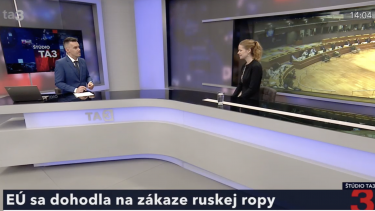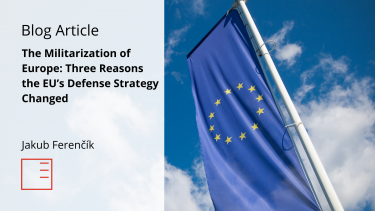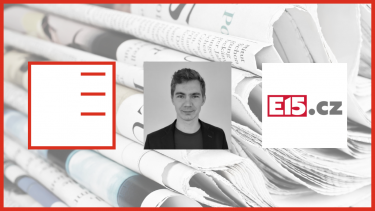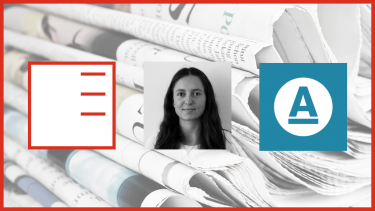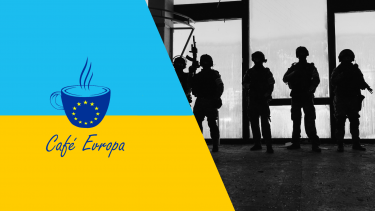Studio TA3: The European Union has agreed on a partial ban on Russian oil. How will this affect the Slovak economy?
Our Associate Research Fellow Zuzana Stuchlíková gave an interview for Slovak TV TA3. Zuzana Stuchlíková talks about the process of approving the latest EU sanctions package against Russia and the ban on Russian oil imports. She discusses how the negotiations went, how the exemptions for Central Europe will work, what it means for fuel prices and what will happen next.
Zjistit více
BLOG: The Militarization of Europe: Three Reasons the EU’s Defense Strategy Changed
Jakub Ferenčík wrote a blog on the topic: The Militarization of Europe: Three Reasons the EU’s Defense Strategy Changed. In his blog, he writes for example about three reasons why the EU defence strategy has changed or the militarisation of Europe and the future of deterrence.
Zjistit více PDFE15.cz: Europe's disconnection from Russian energy as a signal
Our research fellow Michal Hrubý commented for E15.cz on the preparation of the sixth package of anti-Russian sanctions. Michal Hrubý sees the situation as a clear signal to promote nuclear energy and renewable sources, while the extraction of own raw materials will be inevitable.
Zjistit víceAktuálně.cz: How to reduce dependence on Russia: Europe and others tackle gas, oil and coal cuts
Our researcher, Kateřina Davidová, commented for Aktuálně.cz on the latest package of sanctions against Russia by the European Union. According to her, the biggest impact on the Russian economy would be the restriction or ban on the purchase of mineral resources from the largest European customers or even from the whole European union. The best alternative to these energies would be to switch to renewable energy sources, says Kateřina Davidová.
Zjistit více
ČT24: EU leaders negotiate with Chinese leadership
EUROPEUM Institute analyst Alexandr Lagazzi spoke in the program Studia ČT24 about the summit between the European Union and China, which dealt with mutual future relations and economic ties. The conflict in Ukraine was the main topic of discussion on the EU side. It was China's hesitant stance and reaction to economic sanctions against Russia that was addressed, as well as China's rejection of NATO.
Zjistit více
Rádio Slovensko: Is there a room for diplomatic dialogue with Moscow when missiles are still falling on Ukrainian cities?
Žiga Faktor, a research fellow from our Institute and the head of our Brussels office, together with Irena Jenčová from the Euractiv portal, spoke in a Radio Slovakia discussion about sanctions against Russia, the unacceptable demands of the Kremlin, and the search for a way for Europe to replace Russian gas and oil. Will economic pressure force Moscow to come to the negotiating table and declare a ceasefire in Ukraine? Would not greater diplomatic engagement by the United States or China help?
Zjistit více
INVITATION: Café Evropa online: Russian aggression in Ukraine - can we stop Putin?
We would like to invite you to the next debate within the Café Evropa series, this time on the topic: " Café Evropa: Russian aggression in Ukraine - can we stop Putin?". The debate will take place on 2 March at 17:30. What will be the impact of the joint actions of the EU and NATO countries on Russia? Are the arms supplies sufficient or should direct military support be included? Can economic sanctions help Ukraine in any way now, or is this more of a step that will only become apparent in the longer term? Is the collapse of the rouble and the entire Russian market realistic? How can China influence Russia's current economic situation? And how will these sanctions be felt by the Russian population?
Zjistit víceEURACTIV: You're either with us or against us. Serbia is gambling with its future in the EU
Our researcher Jana Juzová commented for Euractiv on how Serbia's ambiguous position is affecting its EU accession process. Serbia is one of the few European countries, that has refused to join the anti-Russian sanctions, even though it has supported Ukraine's territorial integrity and promised to help refugees. The role taken by this Western Balkan country is not surprising, as it has been teetering between the EU and Russia for the last decade. In the accession process, according to our researcher, Serbia's current position towards Russia is not the biggest problem, as Serbia also faces other shortcomings for EU integration.
Zjistit vícePRESS RELEASE: Public statement by the Friends of Free Russia and Czech civil society on Western measures and sanctions
EUROPEUM Institute for European Policy joined public statement by initiative e Friends of Free Russia and Czech civil society on Western measures and sanctions against Russian violations of international law and illegal invasion on the territory of Ukraine.
Zjistit více PDFINVITATION: Eastern Partnership Summit 2021 as a new chapter of the EU-EaP relations: Time for diversification?
We would like to invite you to a debate entitled "Eastern Partnership Summit 2021 as a new chapter of the EU-EaP relations: Time for diversification?" The online debate will take place on December 14 at 17:30.
Zjistit více
Staroměstské náměstí 4/1
Praha 1 - Staré Město
110 00
tel.: +420 212 246 552
email: europeum@europeum.org
https://www.europeum.org
